- Home
- Nancy Means Wright
Mad Season Page 16
Mad Season Read online
Page 16
Colm glanced over at the tape recorder, he didn’t trust machines. No talent for them. But it was grinding away, and a good thing. His head was spinning too fast to record all this.
“If he hit her, the Larocque woman,” Kurt went on, “I didn’t see it. I guess he must’ve. But I didn’t see it. I kept the car running after they went in, and, I don’t know, ten, twenty minutes, they came back. Smith said everything was okay, he got the coat money, some in a drawer, some in the barn. I didn’t want any then, I could smell it. It smelled like shit. I wanted out of there.”
Colm said, “Kosciusko kicked her. With those Medusa boots of his. It eventually killed her, there was an aneurism. My father took a picture. You can see the marks on Belle’s face.”
Kurt dropped his face in his hands, his shoulders heaved like he’d throw up. He’d said all he could for now.
Colm needed to get out of here himself, he buzzed for the officer. He needed to see Ruth, it was important. Something was beating in his left temple. His ankle hurt, bad. Did he imagine it, or was his vision blurred? Was he having a stroke?
When the policeman came back for Kurt, Colm caught the echo: “they,” the boy had said, “they.” There was a third person involved? He grabbed Kurt’s sleeve. “Who was it? Who was that other person who went in?”
Kurt lifted his head like it was holding up the whole universe. “I don’t know, I never saw his face. There was a moon, but I was stoned, I had to psych myself up, you know. He must have come on foot, met the car. Then he put on the stocking.”
“You know more,” Colm said, still gripping the arm. He needed to keep his balance, for one thing.
“I don’t! Well, I mean, Smith, um, Kosciusko, mentioned some guy, someone who knew Larocque, needed the bucks. Though he said the guy didn’t deserve a share, he was a jerk. He was, too, the guy was blubbering like a baby, wanting his split right off, wanting out of the scene. We dropped him off at an intersection. He ran down the road like he’d been goosed. You better find out who.”
Afterward, Colm couldn’t remember exactly what Kurt had said. Someone else involved? A third person?
Was it Wilder after all? Kurt would lie through his teeth for his brother, anyone could see that.
* * * *
When the smoke cleared, the mud settled, it wasn’t as bad as she’d thought—the barn at least. The fire was concentrated in the milk room, they got it before it caught the entire barn. But the heifer pen was destroyed, the whole north end, smoke and water damage everywhere. It would take hours, dollars and dollars, to build it back up. She didn’t know how much insurance there was, Pete took care of that, she’d have to dig through a file.
And they’d lost Charlotte. She groaned at the irony: Jane escaped the fire in Charlotte Bronte’s novel, it was the madwoman who set it—what was her name? That movie on video Emily had wanted her to see, Wide Something Sea, she couldn’t think now. Her mind was a sieve, her brain burned out.
Why was she thinking of a book, with a quarter of her barn in ashes, her son gone—more important than any barn. She sank down on the porch steps.
And now what? She squinted at a commotion over by the barn. It was—who? Her sister-in-law? Yes, running at the smoking barn in her black pumps, Sharon dashing after, trying to pull her back.
Bertha—that was the madwoman’s name, it came to her in a rush. Whoa, she thought, it was so apt. She ran at Bertha, shouted at Sharon: “Go back to the baby, I’ll take care of this.”
She grabbed the woman by the neck. Bertha clawed at her hands, she was trying to get to the ashy barn: “God told me,” she bawled, “in a dream.”
“Told you what?” Ruth shouted. “To bum my barn? Is that what he told you?”
Bertha was there before the fire, Ruth remembered now: “for a visit, for tea,” she’d said in her sugary voice, dressed up like she was going to a rendezvous with some lover. After six months she was back on the nicotine. Sharon asked her to smoke outside because of the baby and she’d said, “Oh, of course, dear,” and left.
Left where? The house, yes. For the barn?
“Too late, sister-in-law. Did you leave your purse in there when you set it? You’ll have to get a new lipstick. Is this how you get your kicks? Your kinky sex? Setting fires? Watching people’s lives burn away? How many have you set? Huh?”
She yanked the woman, still muttering about a dream, back to the house, surprised at her own strength, Sharon yelling, “Mother, are you out of your mind? Let Aunt Bertha go.” Wrestled her up the porch steps, into the kitchen; Bertha sinking down, a doll in polyester with a charred hole in the back of her lilac pants. She rubbed at it, wailed.
“It got you, did it? In the rear end? Well, you’re lucky. Another Bertha I know went up in the flames. Here.” Ruth threw a hunk of butter at the woman. “Heap it on. Like you heaped on that kerosene or whatever you used. Where’d you get it, anyway? In your church? Is that what you used on that family of Italians you tried to run off your street? Colm’s a Catholic, you must know that. Huh?”
Bertha sat up, the skin tight over the thin bones other face. “It was God’s fireworks. I told you, Ruth, I had a dream. Pete wants you to sell, you wouldn’t. So God set that fire.” Her finger waggled at Ruth, accusing.
“You did it for Pete?” Ruth sat down, incredulous.
Here was something out of Mad comics; she took a long breath. No, it couldn’t be Pete, it wasn’t like him, he wouldn’t order his own barn burned, would he? But Bertha’s confused mind .. ..
She stood over her sister-in-law’s chair, shook the sagging shoulders. “Did Pete tell you to? Did he? Tell the truth!”
Anything could happen now, anything was possible. It was mud season. No, blood season, Colm’s pun. No—mad season! The world had gone stark raving mad.
Bertha wept. Remorseful? Or just self-centered. Ruth yanked her up out of the chair, held her, a Raggedy Ann, in her two hands: hands that milked cows, gave feed, picked stone; she was proud of all she’d done since Pete left, she felt seven feet tall.
“He wanted to sell, he did! But the barn? No. It was God’s fire. The burning bush!” She was almost triumphant. Ruth could hear Gabriel’s horn blast. Or was it a fire engine, rumbling out of the drive? She let the woman go.
“It was God,” Bertha warbled again and threw back her orangy head. Her lipstick had leaked into her chin, it was a little red sea.
* * * *
When Colm got to Ruth’s, his father driving, his father who never went over forty, the north end of the barn was a pile of steaming embers. He’d found out only as he left the station, he was in shock. A town truck was wheeling about in the driveway, there was nothing left but smoke and grit. And mud. A sea of mud where trucks, hoses, men, ladders, had dragged through. Ruth and Emily were at the barn door looking in, their arms limp at their sides. Tim was looking out: it seemed a film in slow motion. Emily’s arms were around her mother’s shoulders.
He got out of the car and stumbled over to her. His father shouted, “Watch out, Colm, it’s not gonna heal, you running on that leg.”
There was a free shoulder left, he encircled it. “I didn’t know,” he said, “I heard the sirens, I was at the station. I didn’t know it was your barn. Oh, jeez, I would’ve—”
Ruth looked at him like she’d just gotten up from a long sleep. “Vic,” she said, “was there any news of Vic?”
“It wasn’t Kurt. Or Fat Man. It wasn’t related to anyone we know about, the kidnapping.”
And then he had both shoulders, was turning her slowly in his arms like a drugged child. Until she broke away.
“Hey!”
“Hey,” he shouted again, and rushed at the house. He hobbled after. His father was yelling from the car, and he waved him off. He wanted her to know about Kurt anyway, what he’d done; about the fat man, about the assault, the murder, the third person involved. He wanted her to know it wasn’t a wild-goose chase he’d been on while her barn was burning.
“Ruth, wait!
” He wanted her to know he’d help, build back the bam. He could use a hammer, he’d helped his father build a garage once. And groaned, thinking how it blew down in the next big wind.
She halted in the kitchen door, then glanced about wildly, like the kitchen had disappeared, gone up in flames with the barn. Like there was nothing in the world left.
“Ruthie,” he said, using her old pet name. “What is it, Ruthie? What are you looking for?”
“Her,” said Ruth. And when he said, “Who?” she said, “The kidnapper.”
And then she grabbed his arm and said, “I left her in here and she’s gone. We’ve got to go after her. If she hasn’t run off somewhere, we’ll maybe—”
“Find who, Ruthie? Who?”
But she couldn’t get the name out, she was dragging him over to her pickup, telling a reporter to “bug off,” shrieking orders at Emily and Tim about milking; shouting at Sharon to get supper, to stay by the phone. They shouted back, but she didn’t say where she was going.
“She?” Colm puzzled. Marie? That broker? They were all the shes he could seem to think of. His mind was a maze.
“Go home, Dad,” he yelled at his father. “I’ll get back on my own.” And his father threw up his hands. At least corpses were quiet, they didn’t run off on wild-goose chases.
When Ruth calmed down a bit, when she said, “To Bertha’s,” Colm stared at her. She was leaning into the wheel of the old pickup, her mouth was set like a windup alarm. Bertha? What did Bertha have to do with anything? Bertha was the last one he wanted to see.
“Bertha, jeez,” he said. “Do we have to?”
“Madwoman,” Ruth hissed, and Colm agreed with that at least; limped up the steps at 9 All Saints Lane with his cane, thinking he was involved with two madwomen.
Then here was Bertha, at the door, in a prim gray skirt, purple sweater, like she’d come from a tea party. The scent was thick as insect repellent. You could smell the smoke—or had they brought it with them? It clung inside his nostrils.
“Kidnapper,” Ruth said, and shoved Bertha back in the house.
“Wait a minute here,” Colm said, but Ruth ignored him.
“It was God,” Bertha said, the words spitting out like she was choking on a hunk of meat. The mouth split into two pink lines. The gray skirt hiked up, sank into a plum velvet chair. The house was as pristine as its owner: the ruffly curtains, the matching doilies on the chair arms, the flowered carpet, everything in Good Housekeeping order, even the lipsticked cigarette butts, laid in rows in the ashtrays.
Except Bertha: she was fighting off Ruth. Her sweater was popping its buttons. Ruth had one in her hand, flung it on the floor. “Where is he? Where’s Vic? Is he in this house? Vic!” she screamed, her neck flung back like a crane’s.
Bertha looked stunned, like someone had thrown a rock at her head. Colm wasn’t sure of his role, if he should intervene. Bears killed for their cubs, he wouldn’t put it past human mothers. But thought he’d wait and see. Under different circumstances, he might enjoy this.
Ruth was shaking the purple shoulders while Bertha held herself stiff. “Where did you take him, Bertha? Was this God’s idea too? Like burning my barn? It wasn’t Pete. It was you, you, Bertha. Leave God out of this, dammit. One more word about God and I’ll strangle you!”
Bertha could be a third casualty, Colm thought. He tugged on Ruth’s shoulders, was sorry when she swung back and elbowed him. He had to fight for his breath.
Bertha was talking, she was appealing to Colm: “Get her off me! Off, Ruth! Get off!”
Ruth had Bertha over the chair back, she was yelling, “The truth, dammit. I want the truth!”
And Bertha: “I’m trying—to—say it.”
“She’s trying to say it,” Colm told Ruth.
“To Pete’s,” Bertha choked out. “I took him to Pete’s. You wouldn’t do it,” she accused. She pointed a ragged fingernail at Ruth’s nose.
Ruth relaxed her grip. Her nose was bleeding. She knelt on the chair edge, her knees against Bertha’s chest, amazed.
Bertha yelled, “You kept him here, he could’ve been killed. It was child abuse. I told Pete. He agreed. He—”
“He didn’t tell you to kidnap him!” Ruth leaped back out of the chair, dug her feet into the flowered carpet like she’d root there. Bertha shrank, a pink pincushion, into the plum chair.
“It was your idea, right?” And when Bertha said, “God—”
“God didn’t kidnap my son, you did. You, Bertha!”
Bertha held up a purple arm. “I took him, yes. I got a man in my church to help. It wasn’t kidnapping. You don’t kidnap your own kin. He’s my nephew, we’re close, Vic and me. He’s like my own. I had a vision, I tried to tell you that. He needs a father. He needs Pete. Pete was away, we had to wait three days.”
Ruth uprooted, flew to the phone. Dialed. Bertha jumped up behind her. “Go ahead, call,” she squealed, digging her fingers into her hair—Colm was reminded of a squashed orange. “You’ll see I’m telling the truth. Talk to him. Vic hasn’t called you, right? He’s glad to be with his father! Glad!”
Ruth wheeled about, head down, like she’d charge. Colm was a broken stick between a pair of she-wolves. “Keep dialing,” he told Ruth. What was he hoping to hear? That Pete helped plan the kidnapping? He wanted to inculpate Pete, did he? Win Ruth, like a prize pig at Field Days?
But the boy was the thing. He wanted Vic back. But why didn’t the boy call if he was with his father? He’d know his mother’s worry, it didn’t make sense. It could be another of Bertha’s visions, hallucinations. “Ruth,” he said, trying to offer reason.
Ruth’s eyes were granite. It was a woman on the other end, he could hear the voice, saccharine, like something out of the thirties films. Ruth said nothing for a minute, just listened. It seemed like the room had no air. And then she hung up.
They all waited, even Bertha was waiting.
“It was that woman,” Ruth said, her face pale as milk. “Pete’s woman. Pete is out looking for Vic—he ran off early this morning. Pete was away at some conference, the police located him, he came back last night. He wasn’t even there, Bertha, when you dropped off Vic, Bertha, you bitch! The woman said she tried to call us, it was during the fire. Why didn’t she keep trying! But Vic’s gone now, trying to come home, I know it. Through that jungle! Pete will call me, she said, he didn’t want to worry me. Worry me. Worry me!”
She rushed at the door again. “I have to get to my phone. Vic will call now, he’ll find a way. That woman had him locked in a room till Pete came back. The lies you told her about me, Bertha, you godly woman, you bitch!
“And don’t you dare leave this house!” she shouted back at Bertha. “We’ll figure out what to do with you. Kidnapping. Setting fire to barns. You can’t plead insanity on this one. Or religion, either.”
Bertha looked paralyzed, like she’d heard the words kidnapping and fire for the first time. Her eyes were squashed grapes.
“On second thought,” Ruth yelled, swiveling about at the door, Colm behind her, his ankle on fire, “you should.”
“You’re lost,” Bertha wailed out the door. “You too, Colm. You can be saved—it’s not too late. I can save you, Colm. Colm, come back, I can save—”
“That woman set the fire?” The reporter was out on the sidewalk, she’d followed them here, was holding up a notebook.
Ruth waved her off, ran for the pickup.
“Possibly,” Colm called back. He believed in freedom of the press. “We’ll need proof.”
“I didn’t burn your barn,” Bertha screamed out the door. “I didn’t burn any one of them. Don’t you accuse me of that! It was God told me to take Vic. You’ll pay for this, Colm Hanna, you’ll burn in hell!”
The reporter’s camera flashed, twice.
He already was, he thought, in hell: the ankle shooting pains up and down his body. Ruth screeched off in the pickup before he could slam the door. “Jesus Mary and Joe,” he shouted, “yo
u’re trying to put me back in the hospital.”
“We have to find Vic,” she said, “he’s trying to come home, I know it, he’s running away from Pete. We have to tell the police.”
She took the corner of All Saints Lane on two muddy wheels, while Colm hid his face in his hands.
* * * *
Vic climbed in the rear compartment of the old green Ford, stretched out his small body, and drew his father’s coat up to his chin. It was headed north, this car, he didn’t know how far, he’d watched them go into Kentucky Fried Chicken, two young men in jeans and dirty T-shirts. He wanted to go in, too, he was hungry, he hadn’t thought of taking any food—just left, while the woman was on the toilet. Got a bus to 125th Street with his only dollar, the dollar he took to school that day for his chocolate milk and cookies. They left the car unlocked, and he got in.
When they came back, the two of them were laughing. “You did good, man, nice trick,” one of them said, heaving a bag in the back, licking a strawberry cone. Vic’s heart flipped up in his teeth. In a minute they’d look, they’d see him. He didn’t want them to see him. He didn’t know what they’d do, he’d been warned about these things. He didn’t know how far they were going. They had to be students, though, didn’t they? There were books in the back of the car: a sticker on the rear window said Marist College, Poughkeepsie, N.Y. He didn’t know about Marist College, but Poughkeepsie was north. If he got to Poughkeepsie he’d find another car, a car with a Vermont license plate. Someone in Poughkeepsie, New York, would be headed to Vermont. Someone had to be. He’d get there, he’d get home.
The car screeched off, the radio blared. “Sto-len car,” the boys sang, “ridin’ in a sto-len car ...”
Vic was suddenly so hot, so closed in, he couldn’t breathe. Any minute, he thought, he could die. They’d find his body in the rear compartment of a stolen car. “Kidnapped boy dead of suffocation,” he saw the headlines in the Branbury Independent.

 Stolen Honey
Stolen Honey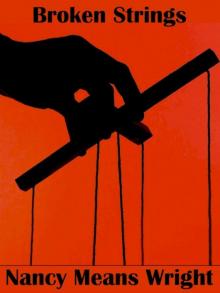 Broken Strings
Broken Strings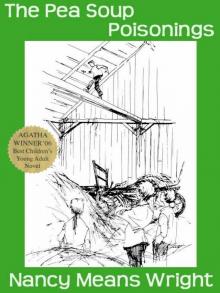 The Pea Soup Poisonings
The Pea Soup Poisonings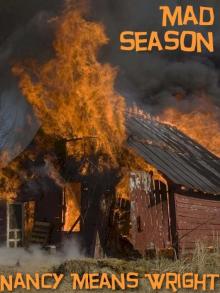 Mad Season
Mad Season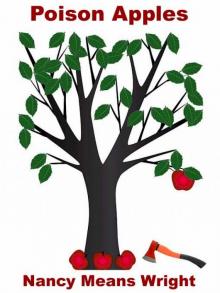 Poison Apples
Poison Apples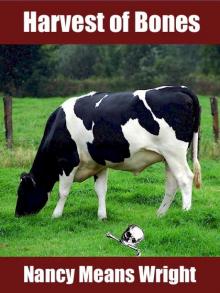 Harvest of Bones
Harvest of Bones